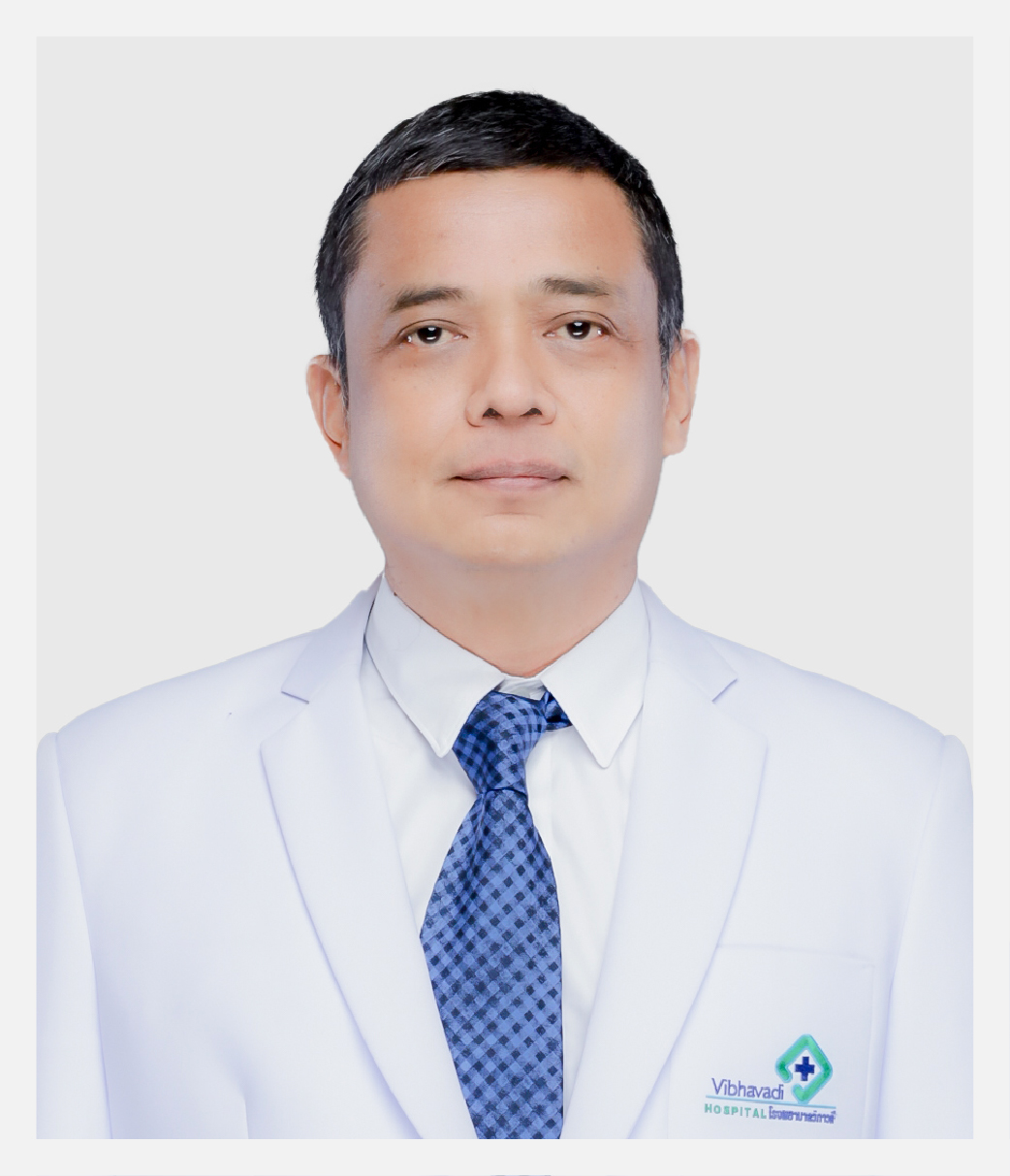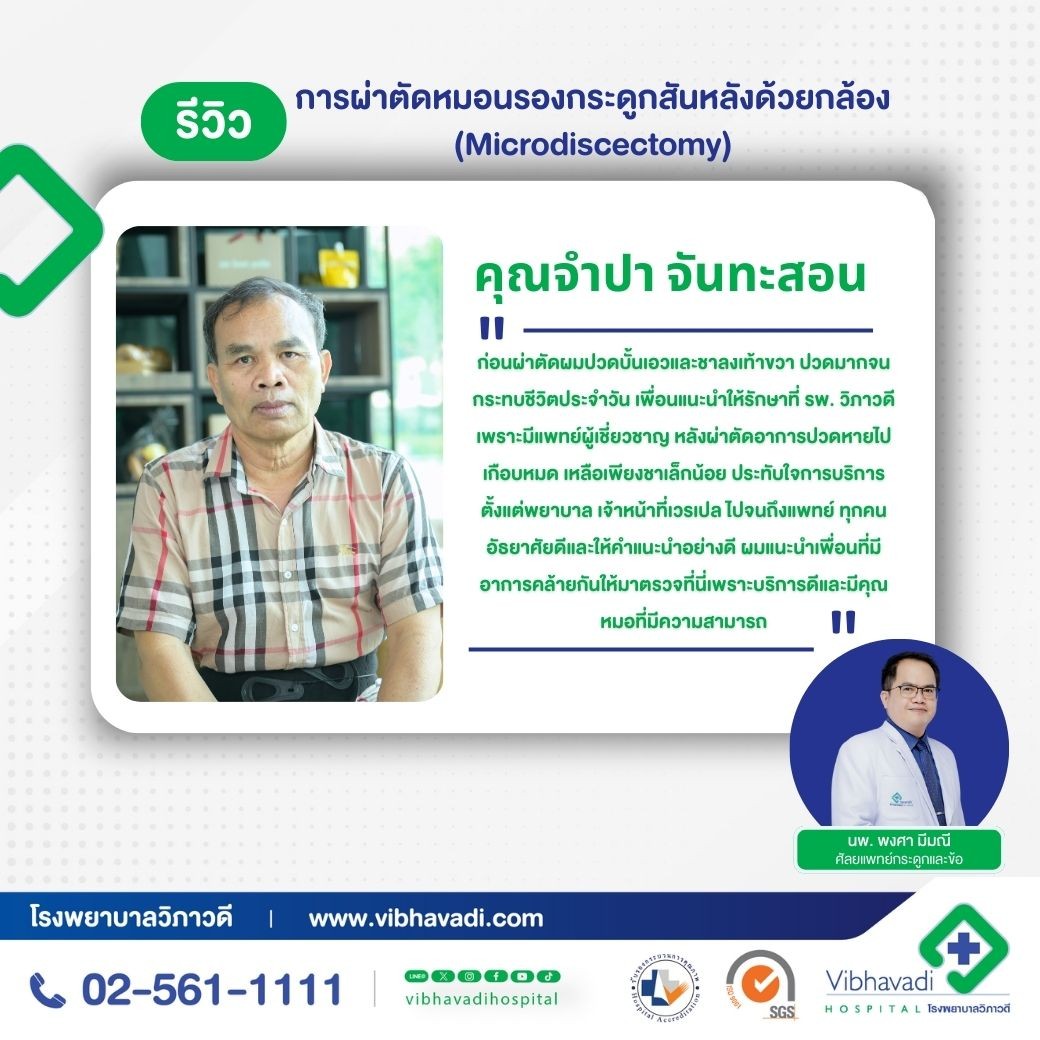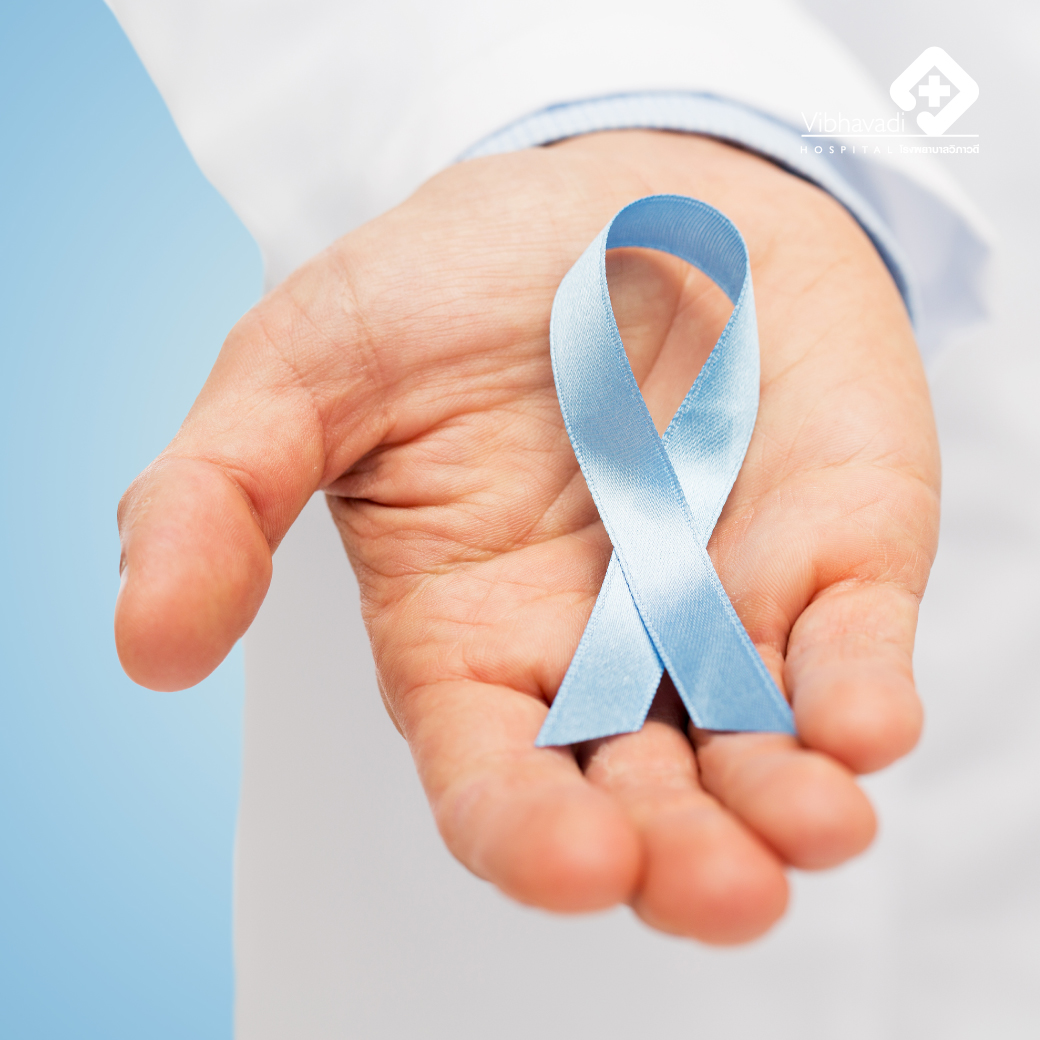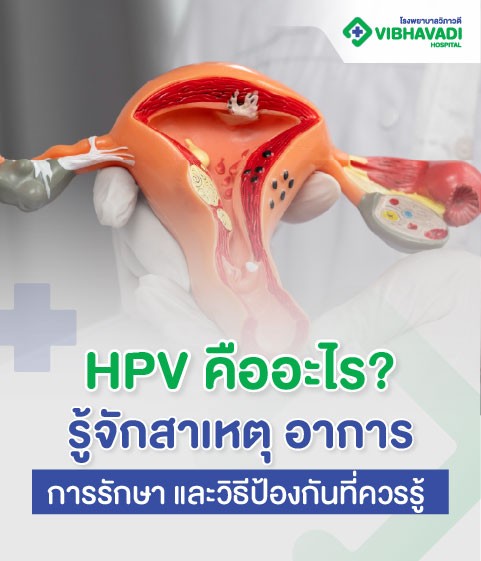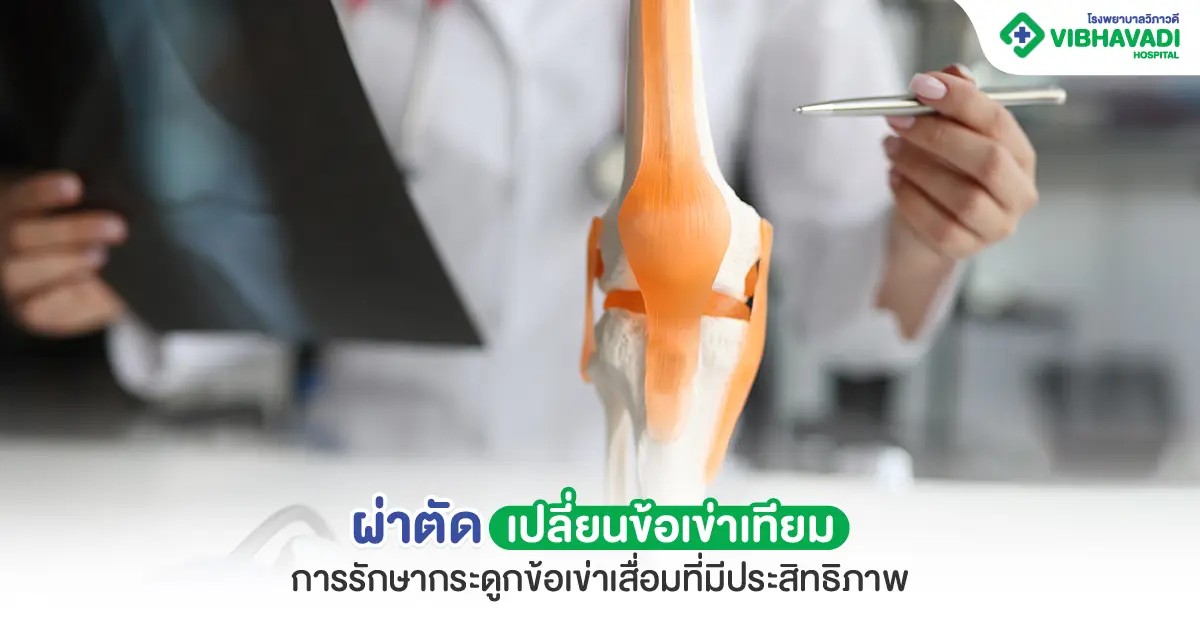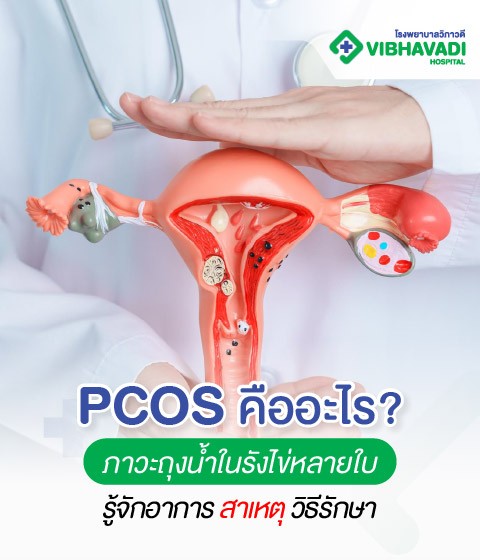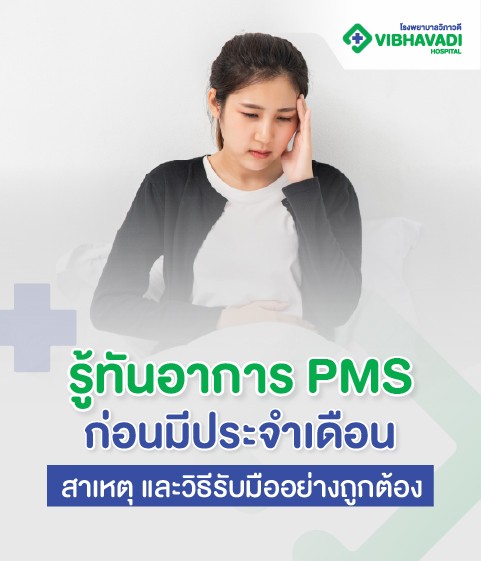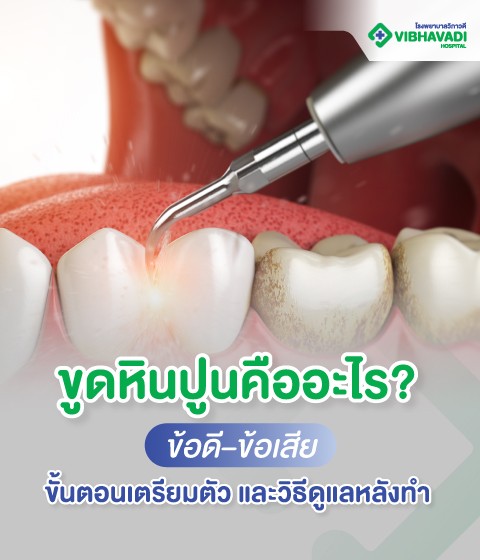Back Pain
Back pain is one of the most common health complaints worldwide. It affects people of all ages and can significantly interfere with daily activities, work performance, and overall quality of life. Whether it presents as a dull ache, sharp stabbing sensation, or stiffness, back pain is often a sign of underlying strain or damage to muscles, ligaments, discs, or nerves in the spine.
At Vibhavadi Hospital, our experienced specialists provide comprehensive diagnostic evaluations and personalized treatment plans for patients experiencing acute or chronic back pain. We aim to not only relieve discomfort but also prevent long-term complications through multidisciplinary care.
Understanding the causes, risk factors, and effective treatment options is the first step in managing back pain and returning to a pain-free life.
What Causes Back Pain?
Back pain can originate from a variety of sources, including the muscles, joints, ligaments, intervertebral discs, and spinal nerves. The most common causes include:
- Muscle or ligament strain: Often caused by improper lifting, sudden awkward movements, or poor posture over time.
- Herniated or bulging discs: When the soft tissue between spinal bones slips out of place, it can press on nearby nerves and cause pain.
- Degenerative disc disease: A condition where discs lose hydration and flexibility with age, leading to reduced cushioning and increased friction.
- Osteoarthritis: Wear and tear of spinal joints that can lead to inflammation, stiffness, and pain.
- Spinal stenosis: Narrowing of the spinal canal that puts pressure on the spinal cord and nerves.
- Skeletal irregularities: Conditions such as scoliosis, which creates abnormal curvature in the spine, can cause chronic back discomfort.
- Injuries and accidents: Falls, sports injuries, or traffic accidents can result in back trauma, sprains, or fractures.
In some cases, back pain may also be a symptom of more serious conditions such as infections, tumors, or kidney problems.
Who Is at Risk of Back Pain?
While back pain can affect anyone, certain individuals have a higher risk based on lifestyle and health conditions.
People with sedentary lifestyles or desk-based jobs are at significant risk. Sitting for prolonged periods, especially with poor posture, can place excessive strain on the lower back muscles and spinal discs. This condition is commonly referred to as “office syndrome.”
Those who lift heavy objects improperly—whether at work or the gym—are also prone to back strain.
Age is another contributing factor. As we grow older, the spine naturally undergoes changes that can lead to degenerative conditions and reduced flexibility.
Overweight individuals place more pressure on the spine, increasing the risk of back injury and joint wear.
Other risk factors include:
- Smoking, which reduces blood flow to spinal tissues
- Lack of physical activity
- Psychological stress or depression
- Pregnancy, due to additional strain on the back
- Poor mattress or unsupportive sleeping positions
Signs and Symptoms of Back Pain
Back pain symptoms can vary depending on the underlying cause, severity, and location of the problem. Common signs include:
- A dull, aching sensation in the lower back
- Sharp or stabbing pain that radiates to the legs (sciatica)
- Stiffness or reduced range of motion
- Muscle spasms or tightness
- Difficulty standing upright or walking for long periods
- Pain that worsens after sitting or sleeping
In cases where nerve involvement is present, symptoms may also include tingling, numbness, or weakness in the legs or feet.
If back pain is accompanied by fever, unexplained weight loss, or loss of bladder/bowel control, immediate medical evaluation is necessary.
How Back Pain Is Diagnosed
Diagnosing the source of back pain requires a detailed medical assessment. At Vibhavadi Hospital, our process begins with a thorough consultation and physical examination. Patients are asked about their symptoms, medical history, lifestyle, and any recent injuries.
Depending on the suspected cause, further diagnostic tests may include:
- X-rays to detect bone alignment or joint degeneration
- MRI scans to visualize soft tissues, including discs and nerves
- CT scans for a more detailed image of the spine
- Blood tests to rule out infection or inflammation
- Nerve conduction studies if nerve damage is suspected
These investigations allow our medical team to identify the root cause of the pain and develop an individualized treatment plan.
Treatment Options for Back Pain at Vibhavadi Hospital
At Vibhavadi Hospital, we offer both conservative and advanced treatment options for back pain, depending on the cause and severity of symptoms.
Non-surgical treatments often provide significant relief and may include:
- Physical therapy: Tailored exercises to strengthen muscles, improve flexibility, and correct posture.
- Medication: Anti-inflammatory drugs, muscle relaxants, or pain relievers to reduce inflammation and discomfort.
- Hot/cold therapy: Alternating heat and ice can ease stiffness and improve circulation.
- Chiropractic care: Spinal adjustments to improve alignment and relieve nerve pressure.
- Acupuncture: Used to stimulate nerve pathways and manage chronic pain.
In some cases, image-guided injections such as corticosteroids may be administered to reduce inflammation near affected nerves or joints.
If conservative treatment fails to provide relief, surgical options may be considered. Common procedures include:
- Discectomy: Removal of part of a herniated disc
- Laminectomy: Removal of bone to relieve spinal pressure
- Spinal fusion: Fusing two or more vertebrae to stabilize the spine
Our spine specialists and orthopedic surgeons use minimally invasive techniques whenever possible to reduce recovery time and enhance results.
Preventing Back Pain: Tips for a Healthier Spine
Preventive strategies are key to maintaining a healthy back and reducing the risk of future pain episodes.
- Maintain proper posture, especially when sitting for long hours. Use ergonomic chairs and sit with your back straight and feet flat on the floor.
- Stretch regularly, particularly if you have a desk job or sedentary lifestyle.
- Lift with your legs, not your back. Keep objects close to your body when carrying heavy items.
- Exercise regularly to strengthen core muscles that support the spine.
- Maintain a healthy weight to reduce pressure on the lower back.
- Avoid smoking, as it reduces oxygen flow to spinal tissues and impairs healing.
- Use a supportive mattress and sleep in a comfortable position.
By following these guidelines, you can minimize your risk of developing back pain and maintain spinal health over the long term.
Related Services at Vibhavadi Hospital
Patients suffering from back pain can benefit from a wide range of specialized services at Vibhavadi Hospital, including:
- Spine and Orthopedic Specialist Consultations
- Physical Therapy and Rehabilitation Programs
- Diagnostic Imaging (X-ray, MRI, CT scan)
- Minimally Invasive Spine Surgery
- Chronic Pain Management Clinic
- Postural Correction and Ergonomic Counseling
- Chiropractic and Traditional Thai Therapy Services
We provide patient-centered care that addresses not just symptoms, but the lifestyle and health factors that contribute to long-term spinal wellness.
Frequently Asked Questions (FAQ)
1. When should I see a doctor for back pain?
If your pain lasts longer than a few weeks, is severe, or is accompanied by other symptoms like numbness, weakness, or bladder issues, you should seek medical attention.
2. Can back pain heal on its own?
Mild back pain often improves with rest, stretching, and self-care. However, recurring or severe pain requires proper diagnosis and treatment to prevent long-term problems.
3. What type of doctor should I see for back pain?
Orthopedic specialists, physiatrists, and neurologists are all trained to diagnose and treat back pain. At Vibhavadi Hospital, our multidisciplinary team ensures complete care.
4. Is surgery necessary for back pain?
Not always. Most back pain cases respond to non-surgical treatment. Surgery is considered only when conservative therapies fail or when there is nerve compression.
5. How can I prevent back pain from returning?
Strengthening your core, maintaining good posture, avoiding prolonged sitting, and making ergonomic adjustments to your workspace can help prevent future episodes.
Regain Comfort and Mobility with Expert Back Pain Care
Living with back pain can affect every aspect of your life, from productivity at work to simple daily activities. But with proper evaluation and evidence-based treatment, recovery is possible. Whether your pain is recent or has persisted for years, Vibhavadi Hospital offers comprehensive support to help you return to a pain-free and active lifestyle.
Schedule your consultation today and let our spine care specialists guide you to better health and comfort.
